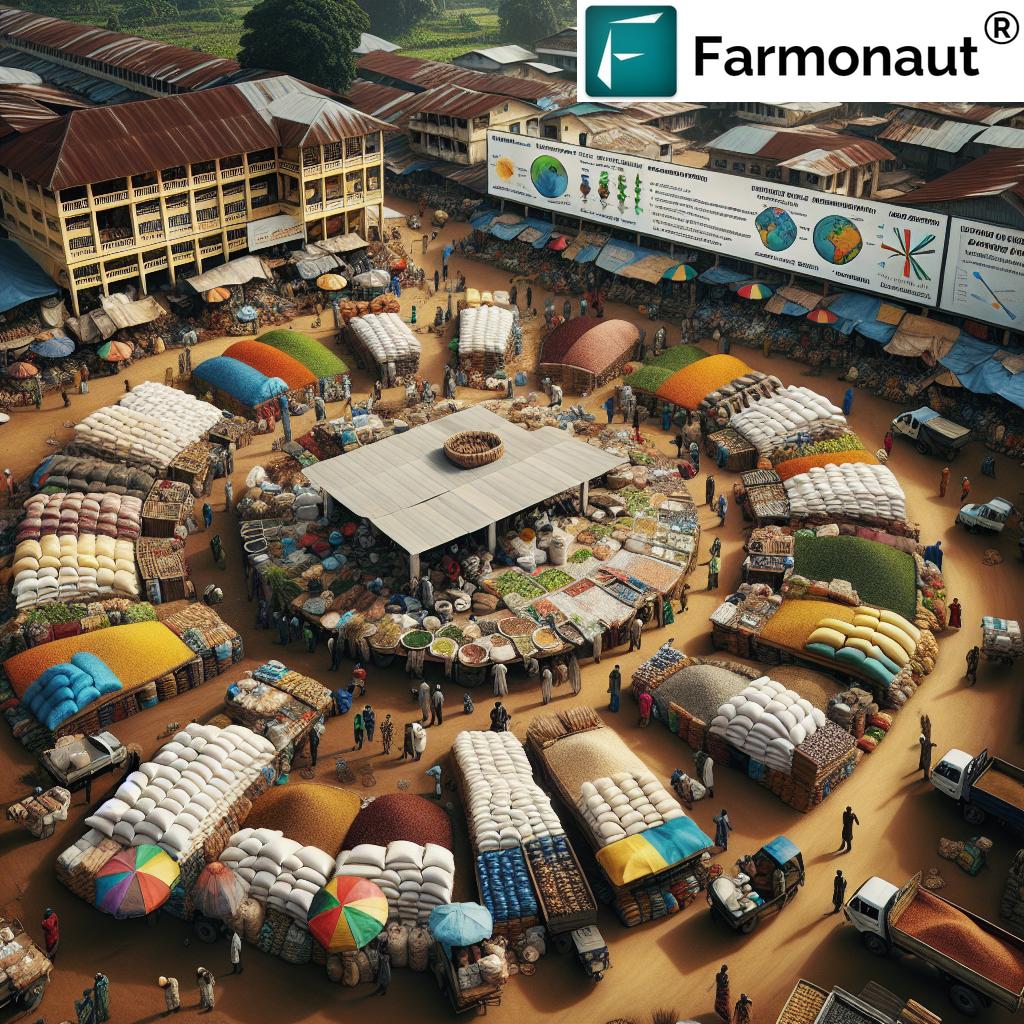Sustainable Rice Production in Sierra Leone: Empowering Smallholders with Agritech Solutions
“70% of Sierra Leone’s population relies on smallholder farming, facing challenges in rice production and food security.”
In the heart of West Africa, Sierra Leone stands at a crucial crossroads in its agricultural journey. As we delve into the complexities of sustainable rice production in this nation, we uncover a tapestry of challenges and opportunities that not only shape the future of food security in Sierra Leone but also echo across the African continent. Our exploration today focuses on the pivotal role of rice in Sierra Leonean culture and economy, the hurdles faced by smallholder farmers, and the innovative agritech solutions that could revolutionize the agricultural landscape.
The Rice Dilemma: A National Challenge
Rice is more than just a staple food in Sierra Leone; it’s a symbol of sustenance, community, and cultural identity. However, the nation faces a paradoxical situation where its most cherished grain is largely imported, draining valuable foreign reserves and exposing the country to global market volatilities. The statistics paint a stark picture:
- 83% of Sierra Leoneans are affected by food insecurity
- 35% of the rice market is dominated by imports
- Approximately $200 million is spent annually on rice imports
These figures underscore the urgent need for a transformation in Sierra Leone’s rice production sector. The government’s ambitious $1.8 billion agricultural investment plan aims to address these challenges, but success hinges on effective implementation and support for smallholder farmers who form the backbone of the nation’s agricultural workforce.
Challenges Facing Smallholder Farmers
Smallholder farmers in Sierra Leone, comprising 70% of the population, face a myriad of obstacles in their quest to increase rice production:
- Infrastructure Deficits: Poor road networks and inadequate irrigation systems hamper access to markets and limit productive capacity.
- Limited Access to Fertilizers: High costs and logistical challenges restrict the use of essential inputs, affecting crop yields.
- Labor Shortages: Rural-urban migration drains the agricultural workforce, leaving farms understaffed.
- Climate Change: Unpredictable weather patterns and extreme events pose significant risks to crop production.
- Lack of Modern Agricultural Practices: Limited access to technology and training hinders the adoption of efficient farming methods.
These challenges create a complex web of issues that require multifaceted solutions. As we explore potential strategies, it’s crucial to consider how innovative agritech solutions can address these pain points effectively.

The Promise of Agritech Solutions
In the face of these challenges, agritech solutions offer a beacon of hope for Sierra Leone’s rice production sector. By leveraging technology, we can address many of the issues plaguing smallholder farmers and pave the way for sustainable agricultural practices.
One such innovative solution is provided by Farmonaut, a pioneering agricultural technology company that offers advanced, satellite-based farm management solutions. Through its android, iOS, web/browser App, and API, Farmonaut aims to make precision agriculture affordable and accessible to farmers worldwide.
Let’s explore how Farmonaut’s technologies can potentially transform rice production in Sierra Leone:
- Satellite-Based Crop Health Monitoring: By utilizing multispectral satellite images, farmers can gain real-time insights into vegetation health, soil moisture levels, and other critical metrics. This data-driven approach enables informed decision-making on irrigation, fertilizer usage, and pest management, ultimately optimizing crop yields and reducing resource wastage.
- AI-Driven Advisory Systems: Farmonaut’s Jeevn AI delivers personalized farm advisory, including real-time insights, weather forecasts, and expert crop management strategies. For rice farmers in Sierra Leone, this could mean timely interventions and improved crop management practices.
- Blockchain-Based Traceability: Implementing blockchain technology in the rice supply chain can enhance transparency, reduce fraud, and build trust among consumers and stakeholders.
- Resource Management Tools: Efficient management of agricultural resources, including machinery and labor, can help smallholder farmers overcome some of the critical challenges they face.
These technologies, when adapted to the specific context of Sierra Leone, have the potential to revolutionize rice production and empower smallholder farmers.

Comparative Analysis: Challenges and Solutions in Sierra Leone’s Rice Production
| Challenges | Impacts | Agritech Solutions |
|---|---|---|
| Infrastructure Deficits | 30% reduction in market access | Satellite imagery for optimal road planning and irrigation system design |
| Limited Fertilizer Access | 25% yield reduction | Precision agriculture for optimized fertilizer application |
| Labor Shortages | 20% decrease in cultivated area | AI-driven farm management systems for resource optimization |
| Climate Change Effects | 15-30% yield variability | Weather forecasting and crop modeling for adaptive farming |
| Market Pressures | 40% income instability for farmers | Blockchain-based supply chain management for fair pricing |
This comparative analysis highlights the significant challenges facing rice production in Sierra Leone and the potential agritech solutions that can address these issues. By implementing these innovative approaches, we can work towards a more resilient and productive agricultural sector.
Government Initiatives and Their Potential Impact
“Sierra Leone’s government has proposed a $1.8 billion agricultural investment plan to boost rice self-sufficiency.”
The Sierra Leonean government’s ambitious investment plan signals a strong commitment to revitalizing the agricultural sector. Key aspects of this plan include:
- Improving infrastructure, particularly roads to agricultural areas
- Creating irrigated land
- Providing resources to smallholder farmers
While these initiatives are promising, their success will depend on effective implementation and the integration of modern agritech solutions. We believe that by combining traditional knowledge with innovative technologies, Sierra Leone can create a sustainable and productive rice sector.
The Role of International Cooperation
As Sierra Leone strives for rice self-sufficiency, international cooperation plays a crucial role. Collaborations with agricultural research institutions, development agencies, and technology providers can bring valuable expertise and resources to the table. However, it’s essential that these partnerships prioritize the needs of smallholder farmers and promote sustainable agricultural practices.
At Farmonaut, we recognize the importance of tailoring solutions to local contexts. Our platform is designed to be adaptable to various agricultural environments, making it a potential asset in Sierra Leone’s journey towards sustainable rice production.
Explore Farmonaut’s API Solutions
Empowering Smallholders: A Path to Food Security
The key to achieving sustainable rice production in Sierra Leone lies in empowering smallholder farmers. This empowerment can take various forms:
- Access to Technology: Providing affordable access to agritech solutions like those offered by Farmonaut can significantly boost productivity.
- Training and Education: Equipping farmers with the knowledge to utilize modern farming techniques and technologies effectively.
- Financial Support: Improving access to credit and insurance to help farmers invest in their farms and manage risks.
- Market Access: Developing efficient supply chains and fair pricing mechanisms to ensure farmers receive adequate returns for their produce.
By focusing on these areas, we can create a more resilient and productive agricultural sector that benefits both farmers and consumers.
Overcoming Challenges: A Collective Effort
The path to sustainable rice production in Sierra Leone is not without its challenges. Some of the key hurdles include:
- Resistance to change among traditional farming communities
- Initial costs associated with adopting new technologies
- The need for consistent power supply and internet connectivity in rural areas
- Balancing increased production with environmental sustainability
Addressing these challenges requires a collective effort from government bodies, NGOs, technology providers, and the farming communities themselves. By working together and leveraging innovative solutions, we can overcome these obstacles and create a thriving rice production sector in Sierra Leone.

The Future of Rice Production in Sierra Leone
As we look to the future, the potential for sustainable rice production in Sierra Leone is immense. By embracing agritech solutions and empowering smallholder farmers, the nation can not only achieve food security but also become a model for sustainable agriculture in West Africa.
Key areas of focus for the future include:
- Climate-Smart Agriculture: Implementing farming practices that are resilient to climate change and contribute to environmental sustainability.
- Digital Integration: Leveraging mobile technology and internet connectivity to provide farmers with real-time information and support.
- Value Chain Development: Creating robust supply chains that connect farmers to markets efficiently and fairly.
- Research and Innovation: Continual investment in agricultural research to develop high-yielding, resilient rice varieties suited to Sierra Leone’s conditions.
By focusing on these areas and leveraging innovative solutions like those provided by Farmonaut, Sierra Leone can transform its rice production sector and secure a sustainable future for its people.
Explore Farmonaut’s API Developer Docs
Conclusion: A Call to Action
Sustainable rice production in Sierra Leone is not just an agricultural challenge; it’s a national imperative that touches on issues of food security, economic development, and social stability. As we’ve explored in this blog post, the path forward involves a delicate balance of traditional knowledge, modern technology, and innovative approaches.
The role of agritech solutions, such as those offered by Farmonaut, cannot be overstated. By providing affordable and accessible precision agriculture tools, we can empower smallholder farmers to overcome the challenges they face and increase their productivity sustainably.
However, technology alone is not enough. Success will require coordinated efforts from all stakeholders – government bodies, international organizations, local communities, and technology providers. It’s a collective journey towards a future where Sierra Leone not only achieves rice self-sufficiency but also becomes a beacon of sustainable agriculture in Africa.
As we conclude, we call on all stakeholders to embrace this vision of sustainable rice production in Sierra Leone. Whether you’re a policymaker, a farmer, an agritech provider, or simply someone passionate about food security and sustainable development, there’s a role for you to play in this transformative journey.
Together, we can turn the challenges of today into the opportunities of tomorrow, ensuring a food-secure future for Sierra Leone and setting an example for sustainable agriculture across the African continent.
Explore Farmonaut’s Mobile Apps:
FAQs
- Q: What are the main challenges facing rice production in Sierra Leone?
A: The main challenges include infrastructure deficits, limited access to fertilizers, labor shortages, climate change effects, and market pressures. - Q: How can agritech solutions help smallholder farmers in Sierra Leone?
A: Agritech solutions can provide real-time crop monitoring, personalized farming advice, optimize resource use, and improve market access through better supply chain management. - Q: What is the government’s plan to boost rice self-sufficiency in Sierra Leone?
A: The government has proposed a $1.8 billion agricultural investment plan aimed at improving infrastructure, creating irrigated land, and providing resources to smallholder farmers. - Q: How does Farmonaut contribute to sustainable agriculture?
A: Farmonaut offers satellite-based farm management solutions, AI-driven advisory systems, and resource management tools that help farmers optimize their practices and increase productivity sustainably. - Q: What role does international cooperation play in improving rice production in Sierra Leone?
A: International cooperation brings valuable expertise, resources, and technologies that can be adapted to local contexts, helping to accelerate the development of sustainable agricultural practices.



